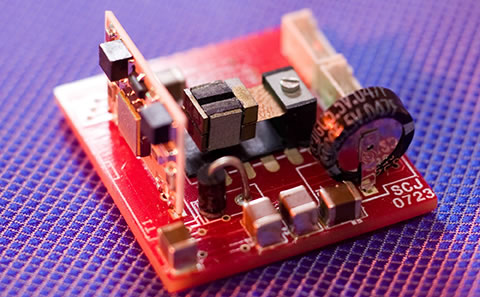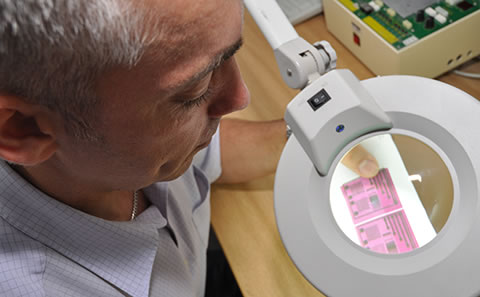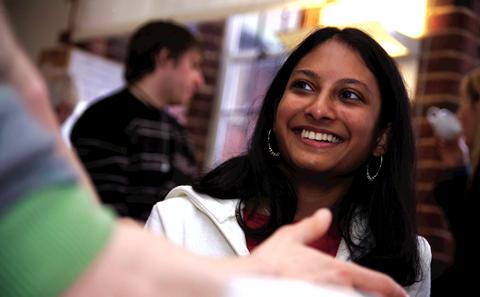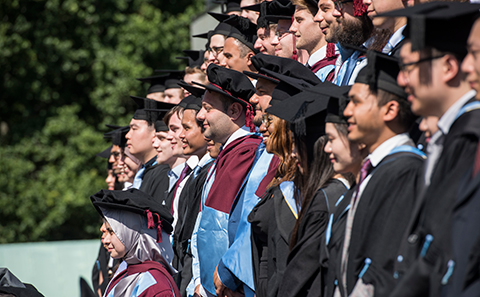
PhD key facts and entry requirements
The Faculty Recruitment & Admissions Office receives about 1000 enquiries regarding PhD admissions every year

The Faculty Recruitment & Admissions Office receives about 1000 enquiries regarding PhD admissions every year

Electronics and Computer Science (ECS) is the leading university department of its kind in the UK

We would like to encourage you to make your application to us on-line

As a PhD student you will need to pay annual tuition fees to the University but there are various ways you could secure funding to cover these costs

The Graduate School in Electronics and Computer Science aims to support you throughout your time undertaking PhD research

Centre for Doctoral Training in Machine Intelligence for Nano-Electronic Devices and Systems
Knowledge Engineer - IT Innovation - School of Electronnics and Computer Science
(previously) Module Lead - 'Living and Working on the Web' and 'Online Social Networks'
Nic Fair is currently a Knowledge Engineer in the IT-Innovation group at the University of Southampton working on European Commission Horizon 2020 projects. With a PhD in Digital Education and Web Science, he has research interests in Personal Learning Networks and networked learning. He has spent eighteen years teaching in a wide range of educational contexts, including Further and Higher Education and has previously led a range of innovation modules at the University of Southampton.
Networked Learning
Personal Learning Networks
Adaptive diagnostics and machine learning
Web Science
Digital Education
EAP
Evans, C., Zhu, X., Chiorean, C., Chipulu, M., Fair, N., Ford, N., Gobbi, M., Grange, L., Harding, Ian, Harris, L., Lock, J., Lotti, E., Mashanovich, G., Perisic, V., Pettit, S., Spencer, V., Telford, M. and Thorpe, K. (2018) Supporting student agency and success in higher education and beyond through the development of assessment feedback skills (the ability to self-monitor and self-evaluate) (Office for Students’ Experimental Innovation Report) University of Southampton 70pp.
Boniface, Michael, Fair, Nicholas, Modafferi, Stefano and Papay, Juri (2020) Security Implications of Interoperability. In Proceedings of the Workshops of I-ESA 2020. CEUR-WS.org. 5 pp .
Fair, Nicholas, Sebastian Russell and Fair, Nic (2022) Dataset to support the University of Southampton Doctoral Thesis "Understanding the networked student: how Personal Learning Networks are used for learning". University of Southampton doi:10.5258/SOTON/D2190 [Dataset]
Fair, Nicholas (2021) A framework for the analysis of personal learning networks. Bonderup, Nina, Hansen, Jens Jorgen, Hansen, Stig Borsen, Ryberg, Thomas and de Laat, Martin (eds.) In Conceptualising and Innovating Education and Work with Networked Learning. Springer. pp. 211-236 . (doi:10.1007/978-3-030-85241-2_12).
Fair, Nicholas (2022) Industry5.0 and sociotechnical theory: theoretical underpinnings. I-ESA 2022: Enterprise Interoperability through connected Digital Twins, Universidad Politecnica de Valencia, Valencia, Spain. 23 - 25 Mar 2022.
Fair, Nicholas (2022) Designing a European Digital Education Hub. 13th International Conference on Networked Learning, University of Mid-Sweden, Sundsvall, Sweden. 16 - 18 May 2022.
Leon Urrutia, Manuel and Fair, Nicholas (2020) Enhancing the Student Experience:: integrating MOOCs into campus-based modules. In, Trends and good practices in research and teaching. Octaedro. (doi:10.36006/16184-08).
Telephone: +44 (0) 23 8059 5980
Email: N.S.Fair@soton.ac.uk
This year's Engineering and Technology Careers Fair, taking place on Thursday 13 February, will welcome an outstanding range of companies at the forefront of autonomous systems development and technology integration.
The Fair has a strong reputation for the quality of companies that attend and for the important role it plays in enabling Southampton students to meet potential employers across many sectors, including digital technology, finance, security, consultancy, transport, and communications.
International industry leaders such as, Cisco, Bloomberg, IBM, Nike, Goldman Sachs, and Schlumberger will be joining some of the UKs most respected consultancies such as Roke Manor Research and Northrop Grumman, with significant representation from niche startup companies in areas such as artificial intelligence, data, finance, and cyber security.
Joyce Lewis, Careers Fair Director, says: "The Fair provides a fantastic opportunity for students to get a really wide-ranging view of the breadth of opportunities for them in the engineering and technology industries. Southampton students already have an excellent reputation for their success in the jobs market and the quality of the companies attending the Fair is a great endorsement of this".
The event will take place in Garden Court on Highfield Campus, with around 2,000 students expected to attend from all University departments. In addition to the global companies attending, there will also be strong representation from the University of Southampton Science Park at Chilworth, with companies looking for the brightest students to join their high-tech ventures.
The event, which has been running for 12 years, is organised by the Universitys Faculty of Engineering and Physical Sciences.
Professor Bashir Al-Hashimi, Dean of Engineering and Physical Sciences, says: "We very much welcome the high quality of companies coming to Southampton to employ our students. They are taking part in the Fair because they are aware of the quality of our students and their ability to innovate and support the development of future technologies".
There are very exciting careers to be built in these new industries and we value our strong links with companies and the excellent relationships built up over time. Many of the stands will include Southampton graduates, demonstrating the contribution that our students are making to the UKs industrial and business success.
Students attending the Fair can expect strong interest from leading employers across the technology industries and from companies that are seeking excellent graduates with high-level competence in technology and engineering as well as business and the sciences. Many University of Southampton opportunities will also be of interest to the students including the Future Worlds startup accelerator, research group opportunities, as well as new directions in teaching.
Our environment is based on our strong research reputation and continues to ensure that companies want to promote their opportunities to our students, Bashir adds. For our part we do our best to increase our students awareness of career opportunities, right from their very first week at the University. We want to prepare them to find the job they want, and raise their aspirations of future achievement and support their future success.
The Fair will run from 11.00am - 3.30pm in Garden Court, B38, on Thursday 13 February. For further information contact Joyce Lewis, tel. +44(0)23 8059 5453; j.k.lewis@ecs.soton.ac.uk.
Academics, industry experts and policymakers are uniting to tackle digital research challenges through a new network led by a consortium of five universities.
The Security, Privacy, Identity, Trust and Engagement NetworkPlus (SPRITE+), which is co-directed by the University of Southampton's Professor Vladi Sassone, will coordinate a multi-disciplinary approach to address current and future problem themes.
Over 100 attendees marked the launch of the network last month in an evening reception in Manchester's Whitworth Art Gallery and a two-day meeting of Expert Fellows and stakeholders that debated the spectrum of issues.
Professor Sassone, Director of Southampton's Cyber Security Academy, says: I am proud to be a co-director of SPRITE+. This national network starts with the ambition to gather together the multi-disciplinary community of trust, identity privacy and security researchers, and to do so in lasting fashion. Southampton's main role in the network will be to organise professional and industrial training and this fits very well with our ongoing commitment in the Cyber Security Academy.
SPRITE+ is funded by the Engineering and Physical Sciences Research Council and led by the University of Manchester, Imperial College London, Lancaster University, Queen's University Belfast and the University of Southampton. The hub has more than 120 Expert Fellows from academic and non-academic contexts covering disciplines including engineering, social sciences and humanities.
Professor Emma Barrett, a Professor of Psychology, Security and Trust at the University of Manchester and Director of Sprite+, says:I am delighted at the amount of interest, enthusiasm and energy that SPRITE+ has already generated. We have had engagement from across the academic community and from research end users in business, government, police and civil society. All are eager for more collaboration on issues of security, privacy, identity and trust in our digital world, and the SPRITE+ team is looking forward to creating opportunities to make that happen.
You can find out more about the Network on the SPRITE+ website.
Erisa Karafili is a Lecturer (Assistant Professor) in Cybersecurity at the University of Southampton. Previously, she was a Marie Curie Fellow at the Department of Computing, Imperial College London. During her Marie Curie project, called AF-Cyber, Erisa investigated the problem of attributing cyber-attacks and focused on constructing techniques and tools to help forensics analysts during cyber-forensics investigation of cyber-attacks. Previously, she was an RA at Imperial College London and a PostDoc at the Technical University of Denmark. Erisa obtained her PhD from the University of Verona, with a special focus on non-classical logics applied to security problems in multi-agent systems. Her main research areas are Formal Methods applied to Security and Privacy problems, Data Sharing in Cloud Environments, Data Access Control, Threat Models for IoT and Hybrid Systems.
Karafili, Erisa and Lupu, Emil (2017) Enabling data sharing in contextual environments: policy representation and analysis. In SACMAT '17 Abstracts: Proceedings of the 22nd ACM on Symposium on Access Control Models and Technologies. The Association for Computing Machinery. 231–238 . (doi:10.1145/3078861.3078876).
Karafili, Erisa, Wang, Linna and Lupu, Emil (2020) An argumentation-based reasoner to assist digital investigation and attribution of cyber-attacks. Forensic Science International: Digital Investigation, 32 (S), [300925]. (doi:10.1016/j.fsidi.2020.300925).
Karafili, Erisa, Cristani, Matteo and Viganò, Luca (2018) A formal approach to analyzing cyber-forensics evidence. Lopez, Javier, Zhou, Jianying and Soriano, Miguel (eds.) In Computer Security: ESORICS 2018. Springer. pp. 281-301 . (doi:10.1007/978-3-319-99073-6_14).
Rasga, João, Sernadas, Cristina, Karafili, Erisa and Viganò, Luca (2020) Time-stamped claim logic. Journal of IGPL, (1367-0751). (doi:10.1093/jigpal/jzaa001).
Karafili, Erisa, Valenza, Fulvio, Chen, Yichen and Lupu, Emil (2020) Towards a framework for automatic firewalls configuration via argumentation reasoning. In 6TH IEEE/IFIP Workshop on Security for Emerging Distributed Network Technologies (DISSECT). 4 pp . (In Press)
Spanaki, Konstantina, Karafili, Erisa, Sivarajah, Uthayasankar, Despoudi, Stella and Irani, Zahir (2021) Artificial intelligence and food security: swarm intelligence of AgriTech drones for smart AgriFood operations. Production Planning and Control. (doi:10.1080/09537287.2021.1882688).
Karafili, Erisa and Valenza, Fulvio (2020) Automatic firewalls’ configuration using argumentation reasoning. Saracino, A. and Mori, P. (eds.) In Third International Workshop on Emerging Technologies for Authorization and Authentication (ETAA 2020 @ESORICS). Springer.. (doi:10.1007/978-3-030-64455-0_8).
Karafili, Erisa, Spanaki, Konstantina and Despoudi, Stella (2021) AI applications of data sharing in agriculture 4.0: A framework for role-based data access control. International Journal of Information Management, 59, [102350]. (doi:10.1016/j.ijinfomgt.2021.102350).
Corbett, Jack and Karafili, Erisa (2021) Private data harvesting on Alexa using third-party skills. In 4th International Workshop on Emerging Technologies for Authorization and Authentication (ETAA) @ESORICS2021. Springer.. (In Press)
Telephone: +44 (0) 23 8059 7695
Email: e.karafili@soton.ac.uk
Li, Bohan (2020) Dataset for: Self-Interference Cancellation and Channel Estimation in Multicarrier-Division Duplex Systems with Hybrid Beamforming. University of Southampton doi:10.5258/SOTON/D1523 [Dataset]
Li, Bohan, Yang, Lieliang, Maunder, Robert and Sun, Songlin (2020) Self-interference cancellation and channel estimation in multicarrier-division duplex systems with hybrid beamforming. IEEE Access, 8, 160653-160669, [9184063]. (doi:10.1109/ACCESS.2020.3020910).
Li, Bohan (2021) Dataset for: Resource Allocation in Millimeter-Wave Multicarrier-Division Duplex Systems with Hybrid Beamforming. University of Southampton doi:10.5258/SOTON/D1911 [Dataset]
Li, Bohan, Yang, Lie-Liang, Maunder, Robert and Sun, SongLin (2021) Resource allocation in millimeter-wave multicarrier-division duplex systems with hybrid beamforming. IEEE Transactions on Vehicular Technology, 70 (8), 7921 - 7935, [9477180]. (doi:10.1109/TVT.2021.3095226).
Li, Bohan (2021) Dataset for: Multicarrier-Division Duplex: A Duplexing Technique for Shift to 6G Wireless Communications. University of Southampton doi:10.5258/SOTON/D1968 [Dataset]
Li, Bohan, Yang, Lie-Liang, Maunder, Robert, Xiao, Pei and Sun, Songlin (2021) Multicarrier-Division Duplex: A Duplexing Technique for Shift to 6G Wireless Communications. IEEE VechicularTechnology Magazine, 16 (4), 57-67. (doi:10.1109/MVT.2021.3113881).
Email: Bohan.Li@soton.ac.uk
Telephone: +44 (0) 23 8059 2650
Email: A.C.Mallari@soton.ac.uk
PhD researcher
machine learning, deep learning, finance, stock prediction
Obthong, Mehtabhorn, Tantisantiwong, Nongnuch, Jeamwatthanachai, Watthanasak and Wills, Gary (2020) A survey on machine learning for stock price prediction: algorithms and techniques. 2nd International Conference on Finance, Economics, Management and IT Business, Vienna House Diplomat Prague, Prague, Czech Republic. 05 - 06 May 2020. pp. 63-71 . (doi:10.5220/0009340700630071).